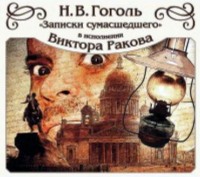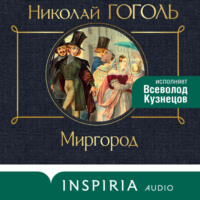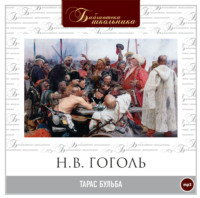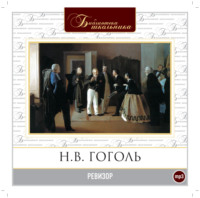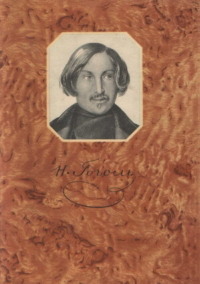 полная версия
полная версияTaras Bulba, and Other Tales
In a moment he was dressed. He blackened his moustache and eyebrows, put on his head a small dark cap; even the Cossacks who knew him best would not have recognised him. Apparently he was not more than thirty-five. A healthy colour glowed on his cheeks, and his scars lent him an air of command. The gold-embroidered dress became him extremely well.
The streets were still asleep. Not a single one of the market folk as yet showed himself in the city, with his basket on his arm. Yankel and Bulba made their way to a building which presented the appearance of a crouching stork. It was large, low, wide, and black; and on one side a long slender tower like a stork’s neck projected above the roof. This building served for a variety of purposes; it was a barrack, a jail, and the criminal court. The visitors entered the gate and found themselves in a vast room, or covered courtyard. About a thousand men were sleeping here. Straight before them was a small door, in front of which sat two sentries playing at some game which consisted in one striking the palm of the other’s hand with two fingers. They paid little heed to the new arrivals, and only turned their heads when Yankel said, “It is we, sirs; do you hear? it is we.”
“Go in!” said one of them, opening the door with one hand, and holding out the other to his comrade to receive his blows.
They entered a low and dark corridor, which led them to a similar room with small windows overhead. “Who goes there?” shouted several voices, and Taras beheld a number of warriors in full armour. “We have been ordered to admit no one.”
“It is we!” cried Yankel; “we, by heavens, noble sirs!” But no one would listen to him. Fortunately, at that moment a fat man came up, who appeared to be a commanding officer, for he swore louder than all the others.
“My lord, it is we! you know us, and the lord count will thank you.”
“Admit them, a hundred fiends, and mother of fiends! Admit no one else. And no one is to draw his sword, nor quarrel.”
The conclusion of this order the visitors did not hear. “It is we, it is I, it is your friends!” Yankel said to every one they met.
“Well, can it be managed now?” he inquired of one of the guards, when they at length reached the end of the corridor.
“It is possible, but I don’t know whether you will be able to gain admission to the prison itself. Yana is not here now; another man is keeping watch in his place,” replied the guard.
“Ai, ai!” cried the Jew softly: “this is bad, my dear lord!”
“Go on!” said Taras, firmly, and the Jew obeyed.
At the arched entrance of the vaults stood a heyduke, with a moustache trimmed in three layers: the upper layer was trained backwards, the second straight forward, and the third downwards, which made him greatly resemble a cat.
The Jew shrank into nothing and approached him almost sideways: “Your high excellency! High and illustrious lord!”
“Are you speaking to me, Jew?”
“To you, illustrious lord.”
“Hm, but I am merely a heyduke,” said the merry-eyed man with the triple-tiered moustache.
“And I thought it was the Waiwode himself, by heavens! Ai, ai, ai!” Thereupon the Jew twisted his head about and spread out his fingers. “Ai, what a fine figure! Another finger’s-breadth and he would be a colonel. The lord no doubt rides a horse as fleet as the wind and commands the troops!”
The heyduke twirled the lower tier of his moustache, and his eyes beamed.
“What a warlike people!” continued the Jew. “Ah, woe is me, what a fine race! Golden cords and trappings that shine like the sun; and the maidens, wherever they see warriors—Ai, ai!” Again the Jew wagged his head.
The heyduke twirled his upper moustache and uttered a sound somewhat resembling the neighing of a horse.
“I pray my lord to do us a service!” exclaimed the Jew: “this prince has come hither from a foreign land, and wants to get a look at the Cossacks. He never, in all his life, has seen what sort of people the Cossacks are.”
The advent of foreign counts and barons was common enough in Poland: they were often drawn thither by curiosity to view this half-Asiatic corner of Europe. They regarded Moscow and the Ukraine as situated in Asia. So the heyduke bowed low, and thought fit to add a few words of his own.
“I do not know, your excellency,” said he, “why you should desire to see them. They are dogs, not men; and their faith is such as no one respects.”
“You lie, you son of Satan!” exclaimed Bulba. “You are a dog yourself! How dare you say that our faith is not respected? It is your heretical faith which is not respected.”
“Oho!” said the heyduke. “I can guess who you are, my friend; you are one of the breed of those under my charge. So just wait while I summon our men.”
Taras realised his indiscretion, but vexation and obstinacy hindered him from devising a means of remedying it. Fortunately Yankel managed to interpose at this moment:—
“Most noble lord, how is it possible that the count can be a Cossack? If he were a Cossack, where could have he obtained such a dress, and such a count-like mien?”
“Explain that yourself.” And the heyduke opened his wide mouth to shout.
“Your royal highness, silence, silence, for heaven’s sake!” cried Yankel. “Silence! we will pay you for it in a way you never dreamed of: we will give you two golden ducats.”
“Oho! two ducats! I can’t do anything with two ducats. I give my barber two ducats for only shaving the half of my beard. Give me a hundred ducats, Jew.” Here the heyduke twirled his upper moustache. “If you don’t, I will shout at once.”
“Why so much?” said the Jew, sadly, turning pale, and undoing his leather purse; but it was lucky that he had no more in it, and that the heyduke could not count over a hundred.
“My lord, my lord, let us depart quickly! Look at the evil-minded fellow!” said Yankel to Taras, perceiving that the heyduke was turning the money over in his hand as though regretting that he had not demanded more.
“What do you mean, you devil of a heyduke?” said Bulba. “What do you mean by taking our money and not letting us see the Cossacks? No, you must let us see them. Since you have taken the money, you have no right to refuse.”
“Go, go to the devil! If you won’t, I’ll give the alarm this moment. Take yourselves off quickly, I say!”
“My lord, my lord, let us go! in God’s name let us go! Curse him! May he dream such things that he will have to spit,” cried poor Yankel.
Bulba turned slowly, with drooping head, and retraced his steps, followed by the complaints of Yankel who was sorrowing at the thought of the wasted ducats.
“Why be angry? Let the dog curse. That race cannot help cursing. Oh, woe is me, what luck God sends to some people! A hundred ducats merely for driving us off! And our brother: they have torn off his ear-locks, and they made wounds on his face that you cannot bear to look at, and yet no one will give him a hundred gold pieces. O heavens! Merciful God!”
But this failure made a much deeper impression on Bulba, expressed by a devouring flame in his eyes.
“Let us go,” he said, suddenly, as if arousing himself; “let us go to the square. I want to see how they will torture him.”
“Oh, my lord! why go? That will do us no good now.”
“Let us go,” said Bulba, obstinately; and the Jew followed him, sighing like a nurse.
The square on which the execution was to take place was not hard to find: for the people were thronging thither from all quarters. In that savage age such a thing constituted one of the most noteworthy spectacles, not only for the common people, but among the higher classes. A number of the most pious old men, a throng of young girls, and the most cowardly women, who dreamed the whole night afterwards of their bloody corpses, and shrieked as loudly in their sleep as a drunken hussar, missed, nevertheless, no opportunity of gratifying their curiosity. “Ah, what tortures!” many of them would cry, hysterically, covering their eyes and turning away; but they stood their ground for a good while, all the same. Many a one, with gaping mouth and outstretched hands, would have liked to jump upon other folk’s heads, to get a better view. Above the crowd towered a bulky butcher, admiring the whole process with the air of a connoisseur, and exchanging brief remarks with a gunsmith, whom he addressed as “Gossip,” because he got drunk in the same alehouse with him on holidays. Some entered into warm discussions, others even laid wagers. But the majority were of the species who, all the world over, look on at the world and at everything that goes on in it and merely scratch their noses. In the front ranks, close to the bearded civic-guards, stood a young noble, in warlike array, who had certainly put his whole wardrobe on his back, leaving only his torn shirt and old shoes at his quarters. Two chains, one above the other, hung around his neck. He stood beside his mistress, Usisya, and glanced about incessantly to see that no one soiled her silk gown. He explained everything to her so perfectly that no one could have added a word. “All these people whom you see, my dear Usisya,” he said, “have come to see the criminals executed; and that man, my love, yonder, holding the axe and other instruments in his hands, is the executioner, who will despatch them. When he begins to break them on the wheel, and torture them in other ways, the criminals will still be alive; but when he cuts off their heads, then, my love, they will die at once. Before that, they will cry and move; but as soon as their heads are cut off, it will be impossible for them to cry, or to eat or drink, because, my dear, they will no longer have any head.” Usisya listened to all this with terror and curiosity.
The upper stories of the houses were filled with people. From the windows in the roof peered strange faces with beards and something resembling caps. Upon the balconies, beneath shady awnings, sat the aristocracy. The hands of smiling young ladies, brilliant as white sugar, rested on the railings. Portly nobles looked on with dignity. Servants in rich garb, with flowing sleeves, handed round various refreshments. Sometimes a black-eyed young rogue would take her cake or fruit and fling it among the crowd with her own noble little hand. The crowd of hungry gentles held up their caps to receive it; and some tall noble, whose head rose amid the throng, with his faded red jacket and discoloured gold braid, and who was the first to catch it with the aid of his long arms, would kiss his booty, press it to his heart, and finally put it in his mouth. The hawk, suspended beneath the balcony in a golden cage, was also a spectator; with beak inclined to one side, and with one foot raised, he, too, watched the people attentively. But suddenly a murmur ran through the crowd, and a rumour spread, “They are coming! they are coming! the Cossacks!”
They were bare-headed, with their long locks floating in the air. Their beards had grown, and their once handsome garments were worn out, and hung about them in tatters. They walked neither timidly nor surlily, but with a certain pride, neither looking at nor bowing to the people. At the head of all came Ostap.
What were old Taras’s feelings when thus he beheld his Ostap? What filled his heart then? He gazed at him from amid the crowd, and lost not a single movement of his. They reached the place of execution. Ostap stopped. He was to be the first to drink the bitter cup. He glanced at his comrades, raised his hand, and said in a loud voice: “God grant that none of the heretics who stand here may hear, the unclean dogs, how Christians suffer! Let none of us utter a single word.” After this he ascended the scaffold.
“Well done, son! well done!” said Bulba, softly, and bent his grey head.
The executioner tore off his old rags; they fastened his hands and feet in stocks prepared expressly, and—We will not pain the reader with a picture of the hellish tortures which would make his hair rise upright on his head. They were the outcome of that coarse, wild age, when men still led a life of warfare which hardened their souls until no sense of humanity was left in them. In vain did some, not many, in that age make a stand against such terrible measures. In vain did the king and many nobles, enlightened in mind and spirit, demonstrate that such severity of punishment could but fan the flame of vengeance in the Cossack nation. But the power of the king, and the opinion of the wise, was as nothing before the savage will of the magnates of the kingdom, who, by their thoughtlessness and unconquerable lack of all far-sighted policy, their childish self-love and miserable pride, converted the Diet into the mockery of a government. Ostap endured the torture like a giant. Not a cry, not a groan, was heard. Even when they began to break the bones in his hands and feet, when, amid the death-like stillness of the crowd, the horrible cracking was audible to the most distant spectators; when even his tormentors turned aside their eyes, nothing like a groan escaped his lips, nor did his face quiver. Taras stood in the crowd with bowed head; and, raising his eyes proudly at that moment, he said, approvingly, “Well done, boy! well done!”
But when they took him to the last deadly tortures, it seemed as though his strength were failing. He cast his eyes around.
O God! all strangers, all unknown faces! If only some of his relatives had been present at his death! He would not have cared to hear the sobs and anguish of his poor, weak mother, nor the unreasoning cries of a wife, tearing her hair and beating her white breast; but he would have liked to see a strong man who might refresh him with a word of wisdom, and cheer his end. And his strength failed him, and he cried in the weakness of his soul, “Father! where are you? do you hear?”
“I hear!” rang through the universal silence, and those thousands of people shuddered in concert. A detachment of cavalry hastened to search through the throng of people. Yankel turned pale as death, and when the horsemen had got within a short distance of him, turned round in terror to look for Taras; but Taras was no longer beside him; every trace of him was lost.
CHAPTER XII
They soon found traces of Taras. An army of a hundred and twenty thousand Cossacks appeared on the frontier of the Ukraine. This was no small detachment sallying forth for plunder or in pursuit of the Tatars. No: the whole nation had risen, for the measure of the people’s patience was over-full; they had risen to avenge the disregard of their rights, the dishonourable humiliation of themselves, the insults to the faith of their fathers and their sacred customs, the outrages upon their church, the excesses of the foreign nobles, the disgraceful domination of the Jews on Christian soil, and all that had aroused and deepened the stern hatred of the Cossacks for a long time past. Hetman Ostranitza, young, but firm in mind, led the vast Cossack force. Beside him was seen his old and experienced friend and counsellor, Gunya. Eight leaders led bands of twelve thousand men each. Two osauls and a bunchuzhniy assisted the hetman. A cornet-general carried the chief standard, whilst many other banners and standards floated in the air; and the comrades of the staff bore the golden staff of the hetman, the symbol of his office. There were also many other officials belonging to the different bands, the baggage train and the main force with detachments of infantry and cavalry. There were almost as many free Cossacks and volunteers as there were registered Cossacks. The Cossacks had risen everywhere. They came from Tchigirin, from Pereyaslaf, from Baturin, from Glukhof, from the regions of the lower Dnieper, and from all its upper shores and islands. An uninterrupted stream of horses and herds of cattle stretched across the plain. And among all these Cossacks, among all these bands, one was the choicest; and that was the band led by Taras Bulba. All contributed to give him an influence over the others: his advanced years, his experience and skill in directing an army, and his bitter hatred of the foe. His unsparing fierceness and cruelty seemed exaggerated even to the Cossacks. His grey head dreamed of naught save fire and sword, and his utterances at the councils of war breathed only annihilation.
It is useless to describe all the battles in which the Cossacks distinguished themselves, or the gradual courses of the campaign. All this is set down in the chronicles. It is well known what an army raised on Russian soil, for the orthodox faith, is like. There is no power stronger than faith. It is threatening and invincible like a rock, and rising amidst the stormy, ever-changing sea. From the very bottom of the sea it rears to heaven its jagged sides of firm, impenetrable stone. It is visible from everywhere, and looks the waves straight in the face as they roll past. And woe to the ship which is dashed against it! Its frame flies into splinters, everything in it is split and crushed, and the startled air re-echoes the piteous cries of the drowning.
In the pages of the chronicles there is a minute description of how the Polish garrisons fled from the freed cities; how the unscrupulous Jewish tavern-keepers were hung; how powerless was the royal hetman, Nikolai Pototzky, with his numerous army, against this invincible force; how, routed and pursued, he lost the best of his troops by drowning in a small stream; how the fierce Cossack regiments besieged him in the little town of Polon; and how, reduced to extremities, he promised, under oath, on the part of the king and the government, its full satisfaction to all, and the restoration of all their rights and privileges. But the Cossacks were not men to give way for this. They already knew well what a Polish oath was worth. And Pototzky would never more have pranced on his six-thousand ducat horse from the Kabardei, attracting the glances of distinguished ladies and the envy of the nobility; he would never more have made a figure in the Diet, by giving costly feasts to the senators—if the Russian priests who were in the little town had not saved him. When all the popes, in their brilliant gold vestments, went out to meet the Cossacks, bearing the holy pictures and the cross, with the bishop himself at their head, crosier in hand and mitre on his head, the Cossacks all bowed their heads and took off their caps. To no one lower than the king himself would they have shown respect at such an hour; but their daring fell before the Church of Christ, and they honoured their priesthood. The hetman and leaders agreed to release Pototzky, after having extracted from him a solemn oath to leave all the Christian churches unmolested, to forswear the ancient enmity, and to do no harm to the Cossack forces. One leader alone would not consent to such a peace. It was Taras. He tore a handful of hair from his head, and cried:
“Hetman and leaders! Commit no such womanish deed. Trust not the Lyakhs; slay the dogs!”
When the secretary presented the agreement, and the hetman put his hand to it, Taras drew a genuine Damascene blade, a costly Turkish sabre of the finest steel, broke it in twain like a reed, and threw the two pieces far away on each side, saying, “Farewell! As the two pieces of this sword will never reunite and form one sword again, so we, comrades, shall nevermore behold each other in this world. Remember my parting words.” As he spoke his voice grew stronger, rose higher, and acquired a hitherto unknown power; and his prophetic utterances troubled them all. “Before the death hour you will remember me! Do you think that you have purchased peace and quiet? do you think that you will make a great show? You will make a great show, but after another fashion. They will flay the skin from your head, hetman, they will stuff it with bran, and long will it be exhibited at fairs. Neither will you retain your heads, gentles. You will be thrown into damp dungeons, walled about with stone, if they do not boil you alive in cauldrons like sheep. And you, men,” he continued, turning to his followers, “which of you wants to die his true death? not through sorrows and the ale-house; but an honourable Cossack death, all in one bed, like bride and groom? But, perhaps, you would like to return home, and turn infidels, and carry Polish priests on your backs?”
“We will follow you, noble leader, we will follow you!” shouted all his band, and many others joined them.
“If it is to be so, then follow me,” said Taras, pulling his cap farther over his brows. Looking menacingly at the others, he went to his horse, and cried to his men, “Let no one reproach us with any insulting speeches. Now, hey there, men! we’ll call on the Catholics.” And then he struck his horse, and there followed him a camp of a hundred waggons, and with them many Cossack cavalry and infantry; and, turning, he threatened with a glance all who remained behind, and wrath was in his eye. The band departed in full view of all the army, and Taras continued long to turn and glower.
The hetman and leaders were uneasy; all became thoughtful, and remained silent, as though oppressed by some heavy foreboding. Not in vain had Taras prophesied: all came to pass as he had foretold. A little later, after the treacherous attack at Kaneva, the hetman’s head was mounted on a stake, together with those of many of his officers.
And what of Taras? Taras made raids all over Poland with his band, burned eighteen towns and nearly forty churches, and reached Cracow. He killed many nobles, and plundered some of the richest and finest castles. The Cossacks emptied on the ground the century-old mead and wine, carefully hoarded up in lordly cellars; they cut and burned the rich garments and equipments which they found in the wardrobes. “Spare nothing,” was the order of Taras. The Cossacks spared not the black-browed gentlewomen, the brilliant, white-bosomed maidens: these could not save themselves even at the altar, for Taras burned them with the altar itself. Snowy hands were raised to heaven from amid fiery flames, with piteous shrieks which would have moved the damp earth itself to pity and caused the steppe-grass to bend with compassion at their fate. But the cruel Cossacks paid no heed; and, raising the children in the streets upon the points of their lances, they cast them also into the flames.
“This is a mass for the soul of Ostap, you heathen Lyakhs,” was all that Taras said. And such masses for Ostap he had sung in every village, until the Polish Government perceived that Taras’s raids were more than ordinary expeditions for plunder; and Pototzky was given five regiments, and ordered to capture him without fail.
Six days did the Cossacks retreat along the by-roads before their pursuers; their horses were almost equal to this unchecked flight, and nearly saved them. But this time Pototzky was also equal to the task intrusted to him; unweariedly he followed them, and overtook them on the bank of the Dniester, where Taras had taken possession of an abandoned and ruined castle for the purpose of resting.
On the very brink of the Dniester it stood, with its shattered ramparts and the ruined remnants of its walls. The summit of the cliff was strewn with ragged stones and broken bricks, ready at any moment to detach themselves. The royal hetman, Pototzky, surrounded it on the two sides which faced the plain. Four days did the Cossacks fight, tearing down bricks and stones for missiles. But their stones and their strength were at length exhausted, and Taras resolved to cut his way through the beleaguering forces. And the Cossacks would have cut their way through, and their swift steeds might again have served them faithfully, had not Taras halted suddenly in the very midst of their flight, and shouted, “Halt! my pipe has dropped with its tobacco: I won’t let those heathen Lyakhs have my pipe!” And the old hetman stooped down, and felt in the grass for his pipe full of tobacco, his inseparable companion on all his expeditions by sea and land and at home.
But in the meantime a band of Lyakhs suddenly rushed up, and seized him by the shoulders. He struggled with all might; but he could not scatter on the earth, as he had been wont to do, the heydukes who had seized him. “Oh, old age, old age!” he exclaimed: and the stout old Cossack wept. But his age was not to blame: nearly thirty men were clinging to his arms and legs.
“The raven is caught!” yelled the Lyakhs. “We must think how we can show him the most honour, the dog!” They decided, with the permission of the hetman, to burn him alive in the sight of all. There stood hard by a leafless tree, the summit of which had been struck by lightning. They fastened him with iron chains and nails driven through his hands high up on the trunk of the tree, so that he might be seen from all sides; and began at once to place fagots at its foot. But Taras did not look at the wood, nor did he think of the fire with which they were preparing to roast him: he gazed anxiously in the direction whence his Cossacks were firing. From his high point of observation he could see everything as in the palm of his hand.


